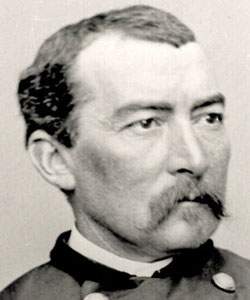Philip Henry Sheridan (American National Biography)
Scholarship
Sheridan found the cavalry units in Virginia widely scattered, their camps filthy, the horses broken down, and the men poorly armed. While he straightened out the routines, reestablished discipline, and cleaned up the camps, he became convinced that the Cavalry Corps was being misused carrying messages, escorting infantry officers, patrolling enemy territory, and guarding a perimeter sixty miles in circumference.
As Grant's brutal overland campaign toward Richmond began in the spring of 1864, Sheridan argued repeatedly with the commander of the Army of the Potomac, Major General George G. Meade, over the proper use of cavalry. After one especially heated exchange on 8 May, Sheridan, flirting with insubordination, demanded permission to mass the cavalry, go out into enemy territory, and whip the enemy cavalry under the legendary Jeb Stuart. When Meade complained to Grant, the general in chief responded mildly, "Did he say that? Well, he generally knows what he is talking about. Let him start right out and do it."
As Grant's brutal overland campaign toward Richmond began in the spring of 1864, Sheridan argued repeatedly with the commander of the Army of the Potomac, Major General George G. Meade, over the proper use of cavalry. After one especially heated exchange on 8 May, Sheridan, flirting with insubordination, demanded permission to mass the cavalry, go out into enemy territory, and whip the enemy cavalry under the legendary Jeb Stuart. When Meade complained to Grant, the general in chief responded mildly, "Did he say that? Well, he generally knows what he is talking about. Let him start right out and do it."
Thomas A. Lewis, "Sheridan, Philip Henry," American National Biography Online, February 2000, http://www.anb.org/articles/05/05-00703.html.





